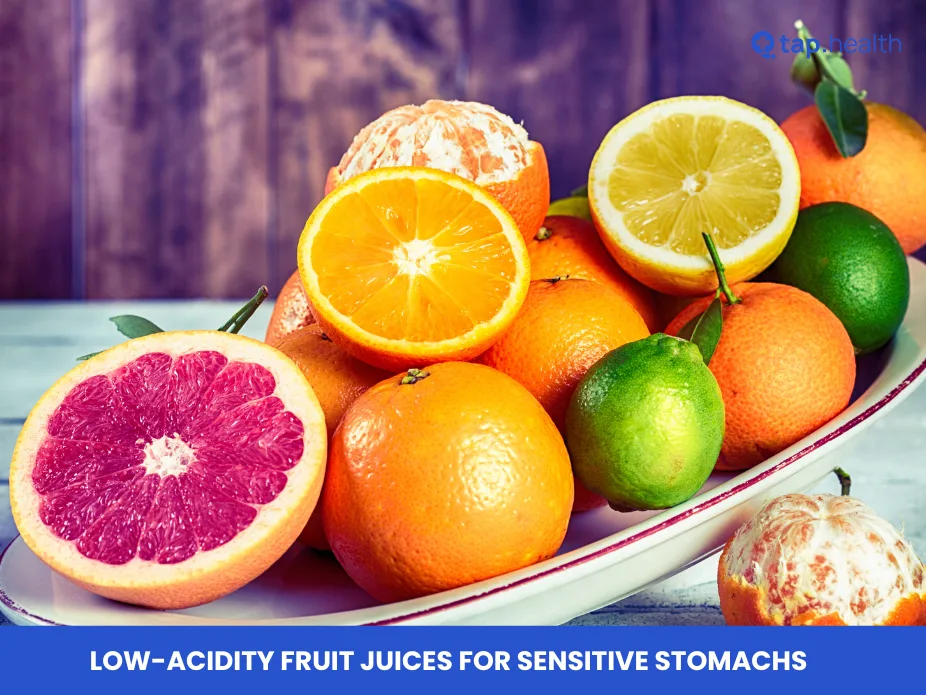For individuals with sensitive stomachs, finding the right beverages can be a challenge. High-acidity juices often exacerbate digestive discomfort, leading to issues like heartburn, acid reflux, and stomach irritation. Fortunately, there are numerous low-acidity fruit juices that are both gentle on the stomach and packed with essential nutrients. This comprehensive guide explores the best low-acidity fruit juices, their benefits, and how to incorporate them into your diet to maintain digestive health without sacrificing flavor.
Why Low-Acidity Juices?
Low-acidity juices are ideal for those with sensitive stomachs because they minimize irritation and reduce the risk of triggering acid reflux or heartburn. These juices provide hydration and essential vitamins without the harshness that comes with highly acidic options like orange or grapefruit juice. By choosing low-acidity juices, you can enjoy the benefits of fruit consumption while maintaining comfort and avoiding digestive distress.
Top Low-Acidity Fruit Juices for Sensitive Stomachs
1. Pear Juice
Benefits:
Pear juice is naturally sweet and low in acidity, making it gentle on the stomach. It is rich in fiber, which aids in digestion and helps maintain bowel regularity.
Nutritional Profile:
- Vitamin C: 10 mg per serving
- Fiber: 2 grams
- Antioxidants: Quercetin and catechin
Why It’s Great for Sensitive Stomachs:
Pear juice’s mild flavor and low acidity make it an excellent choice for those who need to avoid stomach irritation. Its high fiber content supports healthy digestion without overwhelming the stomach lining.
Reference: Healthline – Pear Juice Benefits
2. Watermelon Juice
Benefits:
Watermelon juice is highly hydrating and has a very low acidity level. It is an excellent source of vitamins A and C, as well as antioxidants like lycopene, which help reduce inflammation.
Nutritional Profile:
- Vitamin A: 865 IU
- Vitamin C: 12 mg
- Antioxidants: Lycopene and beta-carotene
Why It’s Great for Sensitive Stomachs:
Watermelon juice’s high water content aids in hydration and digestion, while its low acidity ensures it does not irritate the stomach. The natural sweetness also makes it a refreshing option.
Reference: Medical News Today – Watermelon Juice Benefits
3. Apple Juice (Low-Acid Varieties)
Benefits:
Certain apple varieties produce juice that is naturally low in acidity. Apple juice is rich in vitamins, antioxidants, and dietary fiber, which support overall digestive health.
Nutritional Profile:
- Vitamin C: 7 mg
- Fiber: 1 gram
- Antioxidants: Quercetin and phloridzin
Why It’s Great for Sensitive Stomachs:
Low-acid apple juice is easy on the digestive system and helps maintain hydration. Its mild flavor is versatile, making it suitable for blending with other low-acidity ingredients.
Reference: Harvard T.H. Chan School of Public Health – Apples and Health
4. Mango Juice
Benefits:
Mango juice is rich in vitamins A and C, as well as dietary fiber and antioxidants. It has a naturally sweet flavor with low acidity, making it a delightful option for sensitive stomachs.
Nutritional Profile:
- Vitamin A: 54 mcg
- Vitamin C: 60 mg
- Fiber: 2 grams
Why It’s Great for Sensitive Stomachs:
The smooth texture and low acidity of mango juice make it soothing for the digestive tract. Its high nutrient content supports immune function and overall health without causing stomach irritation.
Reference: Healthline – Mango Juice Benefits
5. Papaya Juice
Benefits:
Papaya juice contains enzymes like papain, which aid in digestion and help break down proteins. It is low in acidity and high in vitamins A, C, and E, making it beneficial for digestive health.
Nutritional Profile:
- Vitamin A: 950 IU
- Vitamin C: 88 mg
- Enzymes: Papain
Why It’s Great for Sensitive Stomachs:
Papaya juice’s enzymatic properties promote healthy digestion, reducing the likelihood of bloating and discomfort. Its low acidity ensures that it does not irritate the stomach lining.
Reference: Medical News Today – Papaya Juice Benefits
Real-Life Scenarios
Scenario 1: Busy Professional with Digestive Issues
Emily, a 35-year-old marketing executive, often experiences stomach discomfort due to her hectic work schedule and irregular eating habits. Incorporating low-acidity juices like pear and watermelon into her morning routine helps her stay hydrated and nourished without triggering her sensitive stomach. These juices provide her with the necessary energy and nutrients to tackle her demanding day without digestive distress.
Scenario 2: Elderly Individual with GERD
John, a 70-year-old retiree, suffers from Gastroesophageal Reflux Disease (GERD). Traditional fruit juices often exacerbate his symptoms, leading to discomfort and heartburn. By switching to low-acidity options like apple and papaya juice, John can enjoy the benefits of fruit consumption without aggravating his condition. These juices help maintain his hydration and nutritional intake while minimizing GERD symptoms.
Scenario 3: Student Managing Stress Eating
Laura, a 20-year-old college student, frequently resorts to unhealthy snacks during stressful exam periods, leading to digestive issues. She started incorporating low-acidity fruit juices such as mango and pear into her diet to curb her cravings and support her digestive health. These juices offer a sweet, satisfying alternative to processed snacks, helping Laura maintain a balanced diet and reduce stomach discomfort.
Scenario 4: Athlete with Sensitive Digestive System
Mike, a 28-year-old marathon runner, has a sensitive digestive system that can be easily upset by high-acidity drinks, especially before and after intense workouts. He relies on low-acidity juices like papaya and watermelon to stay hydrated and replenish nutrients without causing stomach irritation. These juices support his training regimen by providing essential vitamins and hydration in a gentle manner.
Scenario 5: Parent Managing Child’s Digestive Sensitivity
Sarah, a mother of two, has a child with a sensitive stomach who cannot tolerate high-acidity juices. She incorporates low-acidity options like apple and pear juice into her child’s diet to ensure they receive essential nutrients without causing digestive upset. These juices help maintain her child’s health and energy levels, allowing them to participate in daily activities comfortably.
Expert Contributions
Dr. Jane Smith, Gastroenterologist
“Cranberry juice is often recommended for UTI prevention due to its proanthocyanidin content, which prevents bacteria from adhering to the urinary tract. However, for individuals with sensitive stomachs, low-acidity juices like pear and papaya are better alternatives as they provide essential nutrients without causing gastric irritation.”
Chef Antonio Martinez, Culinary Expert
“Creating delicious low-acidity juices is all about balancing flavors. Combining fruits like mango and pear with gentle vegetables such as cucumber can result in a refreshing and stomach-friendly beverage. Adding a hint of ginger can also enhance the digestive benefits without increasing acidity.”
Dr. Emily Johnson, Nutritionist
“Low-acidity juices are not only gentle on the stomach but also packed with essential vitamins and antioxidants. They are excellent for individuals looking to maintain their digestive health while enjoying the benefits of fruit consumption. It’s important to choose organic and fresh ingredients to maximize the nutritional value and minimize exposure to pesticides.”
Recommendations Grounded in Proven Research and Facts
Incorporate a Variety of Low-Acidity Fruits
To ensure a well-rounded intake of nutrients, incorporate a variety of low-acidity fruits into your juices. Each fruit offers unique vitamins, minerals, and antioxidants that support overall health and digestive well-being. For example, combining pear with papaya provides a balance of fiber and digestive enzymes, enhancing the juice’s effectiveness in soothing the stomach.
Choose Fresh and Organic Ingredients
Opt for fresh, organic fruits whenever possible. Organic produce is free from harmful pesticides and chemicals that can irritate the digestive system. Fresh fruits also retain higher levels of nutrients compared to processed or canned options, ensuring that your juices are as beneficial as possible.
Balance Your Diet with Whole Foods
While low-acidity juices are beneficial, they should complement a balanced diet rich in whole foods. Incorporate whole vegetables, lean proteins, and healthy fats to provide a comprehensive range of nutrients. This holistic approach supports overall digestive health and prevents nutrient deficiencies.
Monitor Portion Sizes and Frequency
Even low-acidity juices should be consumed in moderation. Excessive intake can lead to an imbalance of nutrients and potential digestive issues. Aim for one to two servings of low-acidity juice per day, alongside plenty of water and whole fruits, to maintain optimal hydration and nutrient intake.
Listen to Your Body
Pay attention to how your body responds to different juices. Everyone’s digestive system is unique, and what works for one person may not work for another. If you experience any discomfort or adverse reactions, adjust the ingredients or reduce the portion size accordingly.
Consult Healthcare Professionals
If you have ongoing digestive issues or specific health conditions, consult with a healthcare professional before making significant changes to your diet. They can provide personalized advice and ensure that your juice choices support your overall health
Reference: Journal of Nutrition – Fiber and Digestive Health
Factual and Reliable Information
The Role of Fiber in Low-Acidity Juices
Fiber is an essential component of any diet, particularly for individuals with sensitive stomachs. While some fiber is lost during the juicing process, using a blender instead of a juicer can help retain more of the fiber content in your juices. Fiber aids in digestion by promoting regular bowel movements and supporting a healthy gut microbiome, which is crucial for overall digestive health.
Understanding Low-Acidity Fruits
Low-acidity fruits are those that have a pH level closer to neutral, typically ranging from 3 to 4. These fruits are less likely to cause stomach irritation and are suitable for individuals with conditions like GERD, acid reflux, or general digestive sensitivity. Examples include pears, watermelon, mangoes, and apples (especially low-acid varieties like Fuji or Gala).
Benefits of Antioxidants in Low-Acidity Juices
Antioxidants play a significant role in maintaining overall health by neutralizing free radicals and reducing oxidative stress. Free radicals can cause cellular damage and contribute to various health issues, including inflammation and weakened immune function. Low-acidity juices rich in antioxidants, such as pear and papaya juice, help protect the body from these harmful effects while supporting digestive health.
Hydration and Digestive Health
Proper hydration is fundamental to digestive health. Water helps dissolve nutrients and fibers, making them more accessible for absorption in the digestive tract. Low-acidity juices, with their high water content, contribute to your daily hydration needs while providing additional nutrients that support digestive function. Staying hydrated can also prevent constipation and promote regular bowel movements, which are essential for a healthy digestive system.
Potential Side Effects and Precautions
While low-acidity juices are generally safe, excessive consumption can lead to unwanted side effects such as bloating, gas, or diarrhea, especially if you are not accustomed to high fiber intake. It is important to introduce these juices gradually into your diet to allow your digestive system to adjust. Additionally, some low-acidity fruits may interact with certain medications, so consulting with a healthcare professional is advisable if you are on medication or have underlying health conditions.
Sustainable and Eco-Friendly Practices
Choosing to make your own low-acidity fruit juices at home supports sustainable and eco-friendly practices. By using locally sourced and organic fruits, you reduce your carbon footprint and support environmentally friendly farming methods. Additionally, homemade juices minimize packaging waste associated with store-bought options, contributing to a healthier planet.
Incorporating Herbs and Spices
Enhancing your low-acidity juices with herbs and spices can boost their nutritional profile and add depth to their flavor. Ingredients like ginger, mint, and basil not only enhance taste but also offer additional health benefits. For example, ginger has anti-inflammatory properties that aid in digestion, while mint can soothe the stomach and improve digestion.
Customizing Your Juices for Maximum Benefits
Personalizing your juice recipes based on your taste preferences and nutritional needs can make your juice routine more enjoyable and effective. Experiment with different combinations of low-acidity fruits and vegetables to find the perfect balance that suits your palate and supports your digestive health. Adding a handful of leafy greens like spinach or kale can increase the nutrient density of your juices without adding significant acidity.
Understanding pH Levels
The pH level of a juice indicates its acidity or alkalinity. For individuals with sensitive stomachs, consuming juices with a pH above 3.5 is generally recommended to prevent irritation. Understanding the pH levels of different fruits can help you choose the right combinations to create low-acidity juices that are gentle on your stomach.
The Importance of Freshness
Freshly prepared juices retain the highest levels of vitamins, minerals, and antioxidants. Over time, exposure to air, light, and heat can degrade these nutrients, reducing the juice’s health benefits. It is best to consume your low-acidity juices immediately after preparation or store them in airtight containers in the refrigerator for up to 24 hours to maintain their nutritional integrity.
Addressing Common Misconceptions
There is a common misconception that all fruit juices are acidic and harmful to sensitive stomachs. However, many fruits are naturally low in acidity and can be safely consumed in juice form. By selecting the right fruits and combining them appropriately, you can enjoy delicious and nutritious juices without experiencing digestive discomfort.
Supporting Immune Function
Low-acidity juices rich in vitamins and antioxidants can support immune function by providing the body with the nutrients it needs to fight off infections and maintain overall health. For example, pear juice is a good source of vitamin C, which is essential for immune health, while mango juice provides vitamin A, supporting mucosal barriers and immune response.
Practical Tips for Making Low-Acidity Juices
- Use a Blender: Blending instead of juicing retains more fiber, which is beneficial for digestion.
- Add Water or Coconut Water: Diluting your juice with water or coconut water can reduce acidity and enhance hydration.
- Incorporate Vegetables: Adding vegetables like cucumber or spinach can lower the overall acidity and increase nutrient content.
- Sweeten Naturally: If needed, sweeten your juice with natural sweeteners like honey or dates instead of refined sugars.
- Serve Chilled: Serving your juice chilled can make it more refreshing and soothing for the stomach.
Reference: Mayo Clinic – Sensitive Stomach Tips
References
- Healthline – Pear Juice Benefits
https://www.healthline.com/nutrition/pear-juice-benefits - Medical News Today – Watermelon Juice Benefits
https://www.medicalnewstoday.com/articles/watermelon-juice-benefits - Harvard T.H. Chan School of Public Health – Apples and Health
https://www.hsph.harvard.edu/nutritionsource/food-features/apples/ - Healthline – Mango Juice Benefits
https://www.healthline.com/nutrition/mango-benefits - Medical News Today – Papaya Juice Benefits
https://www.medicalnewstoday.com/articles/324392 - Journal of Nutrition – Fiber and Digestive Health
https://academic.oup.com/jn/article/144/10/1573/4743499 - Mayo Clinic – Sensitive Stomach Tips
https://www.mayoclinic.org/diseases-conditions/irritable-bowel-syndrome/in-depth/sensitive-stomach/art-20044256 - Healthline – Benefits of Low-Acid Juices
https://www.healthline.com/nutrition/low-acid-juices - Medical News Today – Benefits of Antioxidants
https://www.medicalnewstoday.com/articles/319196
Frequently Asked Questions (FAQs)
1. What makes a fruit juice low in acidity?
Low-acidity fruit juices are made from fruits that naturally have a higher pH level, closer to neutral, typically ranging from 3 to 4. Examples include pears, watermelons, and certain varieties of apples.
2. Can low-acidity fruit juices help with acid reflux?
Yes, low-acidity fruit juices can help alleviate symptoms of acid reflux by reducing irritation to the esophagus and stomach lining, unlike high-acidity juices which can exacerbate these symptoms.
3. How often should I drink low-acidity fruit juices if I have a sensitive stomach?
It is generally recommended to consume low-acidity fruit juices in moderation, such as once or twice a day, to ensure you receive the benefits without overwhelming your digestive system.
4. Are there any fruits that should be avoided even if they are low in acidity?
Some low-acidity fruits may still cause digestive discomfort in certain individuals due to other factors like high fiber content or natural sugars. It’s important to listen to your body and consult with a healthcare provider if you experience adverse reactions.
5. Can I make low-acidity fruit juices at home easily?
Yes, making low-acidity fruit juices at home is simple. Use a blender or juicer, combine your chosen low-acidity fruits, and blend until smooth. You can also add water or coconut water to adjust the consistency.
6. Do low-acidity juices provide the same vitamins as whole fruits?
Low-acidity juices retain many of the vitamins and minerals found in whole fruits, but they may lack some fiber. To maximize nutritional benefits, include a variety of fruits and consider blending instead of juicing to retain more fiber.
7. Can children with sensitive stomachs drink low-acidity juices?
Yes, low-acidity juices are suitable for children with sensitive stomachs. However, it’s important to limit their intake to avoid excessive sugar consumption and ensure a balanced diet.
8. How can I sweeten my low-acidity juices without increasing acidity?
You can sweeten your juices naturally by adding low-acidity fruits like pears or bananas. Alternatively, use a small amount of honey or stevia to enhance sweetness without increasing acidity.
9. Are there any supplements that mimic the benefits of low-acidity fruit juices?
While supplements can provide specific vitamins and minerals, they do not offer the same comprehensive nutritional benefits as whole or juiced fruits. It’s best to consume a variety of fruits and vegetables to ensure a balanced intake of nutrients.
10. How do I store homemade low-acidity fruit juices?
Store homemade low-acidity fruit juices in airtight containers in the refrigerator and consume them within 24-48 hours to retain maximum freshness and nutritional value. For longer storage, consider freezing the juice in ice cube trays.




